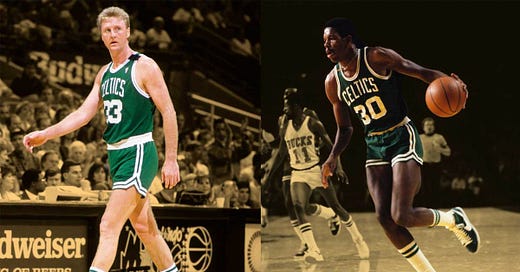Greatness May Alienate Colleagues
When star leaders and employees gain an inordinate amount of praise
Someone’s excellence, even if they are judged by the collective to be a team player, can separate themselves in unwanted ways that may not be entirely beneficial to the whole.
It was a point that a strong performer mentioned, bringing up what happened in his workplace as a player for the Boston Celtics decades ago with the legendary Larry Bird.
"Larry's greatness somewhat alienated (him) from the rest of the team because he was so great, so great,” said Cedric Maxwell.
He explained why he used the word alienation when he and his colleagues twice achieved the organizational mountaintop in their profession. It’s valuable to know.
"The hardest guy to play with is a superstar, especially in a team sport,” Maxwell recalled. “You will always be in his shadow. Not a fault of his but that's just the way it is," Maxwell said.
Is alienation the correct or best word? People can debate it.
What if we rephrased the quote above to say, “The hardest person to work with is the star in the organization, when it’s a team effort. You’ll always be in their shadow no matter how much critical value you produce.”
That belief can be disheartening or infuriating, depending on the person.
This may be happening in many a workplace, where working with a “star,” whether real or perceived, in a high-achieving organization can be experienced with less satisfaction due to a lack of communicated appreciation and acknowledgement, intangible and tangible.
People may never be, or feel, as recognized, respected and credited as another person, feeling as though they are working deep in the shadows for organizational success and possibly not experiencing desired fulfillment and happiness for their important role and productivity.
This speaks to “the quiet sacrifices made by key contributors,” in objective, memorable accomplishments, wrote Yakshpat Bhargava, where many skilled, productive contributors excel to achieve and surpass expected and demanded goals, yet noticing that they’re under valued, leading to discouragement or resentment.
So what is the point of this article? Yes, there is a popular saying that talks about how much can be accomplished when no one cares who gets the credit and there is truth in it. Yet, humans are more complex than that statement.
They are emotional and when they feel that their contributions may not be fully noticed, valued and complimented, they are going to feel less satisfied.
Organizations and “star” performers can remember it and make a strong, consistent effort to show people, by name, how specifically valuable they are to the whole and communicate it inside and outside the organization, to all stakeholders.
We may believe that people shouldn’t need or probably don’t expect this from us, yet that’s not how most people are naturally, emotionally and psychologically wired.
Humans also naturally compare their experiences and lives to other people and it can create, if not envy, then more than they have now, especially if they are working hard, sacrificing for the better of the mission and are producing well in their particular role.
Michael Toebe is the specialist at Reputation Intelligence, helping individuals and organizations with matters of credibility, trust, decision analysis, communications, relationships and reputation.
You can DM him on Substack or contact him below for consulting, risk analysis, coaching, ongoing advisory, a variety of proactive and responsive communications and reputation (not legal) representation.
Be sure to take a look at the Reputation Intelligence guides and services for sale. If subscribing is of interest to you or someone you know, please click the “subscribe now” button to get started.







